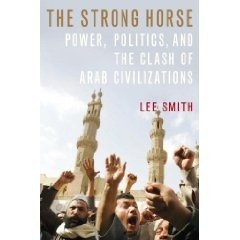I think someone really needs to take up this challenge by Chris at Khowaga.us:
Introducing the Egyptian Revolution Orientalist Essay Contest! In 500 words or less, channel your favorite Orientalist scholar and explain why the Egyptian revolution is utterly unremarkable and destined to fail. Extra points for condescending and paternalistic language!
But then again it appears Lee Smith is in town, so he's bound to win the lovely picture Chris has put up as a prize. After all in recent weeks he's given us:
Protests in Egypt | The Weekly Standard
The Mubarak regime is not as brittle as that of Tunisia’s erstwhile president-for-life, Zine El Abidine Ben Ali, and right now seems to be in little danger of falling.
. . .
For all the excitement surrounding the demonstrations, it’s worth remembering that the nominally docile Egyptian masses take to the streets with some regularity, especially when it involves food prices and living wages. More to the point, it is an unfortunate fact of modern Egyptian history that its people are often susceptible to ideological politics. For instance, Nasser led the country to disaster and yet compared to Sadat the peacemaker or Mubarak the stolid pharaoh who has kept the country stable, if static, it is Nasser who owns the affections of the Egyptian masses. That is to say, we don’t know exactly what the protestors want. There are those who hate the regime because it jails and tortures bloggers and those who hate it because it won’t make war on Israel. No doubt some of the young are just fed up they have never known another Egyptian ruler in their lifetimes. Some of the youth are democrats and others are decidedly not.
And this classy piece equating protestors with suicide bombers, as :
As street protests brought the reign of Tunisia’s president Zine El Abidine Ben Ali to an end, imitators around the region lit fire to themselves, perhaps in the hope of similar results, or maybe just out of a chronic desperation that seems to have no limits. Either way, it is not merely the Arab regimes that should be worried by these popular uprisings, but anyone who fears the dangers of political activism carried out under the sign of self-murder.
“My concern is that the same people who recruit for suicide bombers are now going to start recruiting for these self-immolation operations,” says Robert Holley, a former U.S. diplomat who worked extensively in the region. “The whole aim of these guys is to destabilize these regimes.”
The person quoted here, Robert Holley, is a former State Department diplomat who, after retirement, became a paid lobbyist for the Moroccan government. The rest of Smith's piece is basically advertorial for the Moroccans.
Anyway, Smith now has to reconcile his Strong Horse Theory (that Arabs always cheer for the strongest person around — hardly convincing in the first place, but positively odd in an age of Arab uprisings) with what must be a bothersome reality. I'm sure he will do so with brio, and Chris will have a winner.

